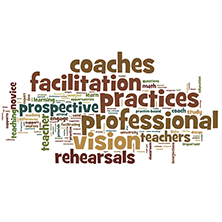
Current teacher education programs are often found to be disconnected from practice as new teachers struggle to apply what they learned from university courses to classroom settings (Ball & Cohen, 1999; Ball & Forzani, 2010). In response, some have recently advocated for a practice-based approach to teacher education, where prospective teachers have opportunities to engage in the work of teaching within their university courses (Ball & Cohen, 1999; Grossman, Hammerness, & McDonald, 2009). One method to create practice-based opportunities for learning to teach is to have prospective teachers engage in rehearsals (Lampert et al., 2013; Kazemi, Franke, & Lampert, 2009; Ghousseini, Beasley, & Lord, 2015; Pfaff, 2013; 2015). Rehearsals are simulations of teaching in which a prospective teacher practices teaching a lesson while other prospective teachers act as elementary or secondary students. Unlike other simulation models, rehearsals provide the ability to “pause” or interject to allow teacher educators and prospective teachers to exchange questions, suggestions, and reflections about teaching (Lampert et al., 2013).
The teacher educator (or coach) plays an important role in facilitating such conversations during rehearsals (Pfaff, 2015). When making such interjections, coaches must consider when to stop and what to say to support the prospective teacher. One key component of facilitation is what they notice and attend to during classroom interactions, drawing on their professional vision (Goodwin, 1994). This preliminary study aims to examine differences in the facilitation practices and professional vision of novice and experienced coaches. This research is guided by the following questions:
1. What types of interjections do novice and expert coaches make when facilitating rehearsals?
2. What are differences in the professional vision of novice and expert coaches, particularly when reflecting on when, how, and why to interject?
3. How do coaches learn to facilitate rehearsals?
The study took place within the context of one undergraduate math teaching methods course that is required as part of the Bachelors of Education in Kindergarten and Elementary Education program at Canadian university. Data included video-recordings of rehearsals, coach meetings, and interviews and will be analyzed using methods of interaction analysis (Jordan & Henderson, 1995).
The results will provide theoretical distinctions for examining coaches’ practice and professional vision and will be used to design supports for novice coaches learning to coach rehearsals. The designed supports will be used in a multi-year design study (e.g., Cobb et al., 2003) to investigate how novice coaches learn to attend to important moments in rehearsals and learn to engage in coaching practices that support prospective teachers’ learning.
Research Team:
Marta Kobiela, Principal Investigator, Assistant Professor, McGill University
Vandana Chandrasekhar, Research Assistant, Ph.D. Student, McGill University
Saba Din, Research Assistant, Ph.D. Student, McGill University
This project is funded by a McGill University Social Sciences & Humanities Internal Development Grant.
Contact:
Assistant Professor, Department of Integrated Studies in Education (DISE)
Faculty of Education, McGill University
Department of Integrated Studies in Education
3700 McTavish
Montreal, Quebec H3A 1Y2
marta.kobiela [at] mcgill.ca
(514) 398-4527 Ext. 094466
References:
- Ball, D. L., & Cohen, D. K. (1999). Developing practice, developing practitioners: Toward a practice-based theory of professional education. In G. Sykes & L. Darling-Hammond (Eds.), Teaching as the learning profession: Handbook of policy and practice (pp. 3-32). San Francisco: Jossey Bass.
- Ball, D,L, & Forzani, F. M (2010). What does it take to make a teacher? Phi Delta Kappan, 92(2): 8-12.
- Cobb, P., Confrey, J., diSessa, A. A., Lehrer, R., & Schauble, L. (2003). Design experiments in educational research. Educational Researcher, 32(1), 9-13.
- Goodwin, C. (1994). Professional vision. American anthropologist, 96(3), 606-633.
- Ghousseini, H., Beasley, H., & Lord, S. (2015). Investigating the potential of guided practice with an enactment tool for supporting adaptive performance. Journal of the Learning Sciences, 24(3), 461-497.
- Grossman, P., Hammerness, K., & McDonald, M. (2009). Redefining teaching, re-imagining teacher education. Teachers and Teaching: Theory and Practice, 15(2), 273-289.
- Jordan, B., & Henderson, A. (1995). Interaction analysis: Foundations and practice. The Journal of the Learning Sciences, 4(1), 39-103.
- Kazemi, E., Franke, M., & Lampert, M. (2009). Developing pedagogies in teacher education to support teachers’ ability to enact ambitious instruction. In Hunter, B. Bikcknell & T. Burgess (Eds.), Crossing divides: Proceedings of the 32nd annual conference of Mathematics Education Research Group of Australasia (Vol. 1, pp. 12- 30). Palmerston North, NZ: MERGA.
- Lampert, M., Franke, M. L., Kazemi, E., Ghousseini, H., Turrou, A.C., Beasley, H., Cunard, A. & Crowe, K. (2013). Keeping it complex: Using rehearsal to support novice teacher learning of Ambitious Teaching. Journal of teacher Education, 64(3), 226-243.
- Pfaff, E. (2013). Evidence of teacher educator feedback from coaching rehearsals into classroom enactments of ambitious math discussions. Paper presented at the National Council of Teachers of Mathematics – Research Conference.
- Pfaff, E. (2015). Using rehearsals to support teachers in orchestrating mathematically productive conversations. Report submitted to IES grant for “Data Modeling Supports the Development of Statistical Reasoning.”
